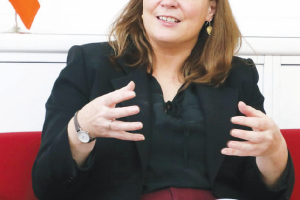
Today’s guest, Eleni Gabre-Madhin, PhD, is an Ethiopian economist and former CEO of the Ethiopia Commodity Exchange (ECX). She is a globally recognized thought leader in agricultural markets and African development. Eleni successfully transformed the Ethiopian commodity exchange into a modern, efficient market, benefiting smallholder coffee producers and achieving annual trading of 1.4 billion USD in just four years.
Born in Addis Ababa, Ethiopia, Eleni had a multicultural upbringing, living in six countries. She is multilingual and holds a PhD in Applied Economics from Stanford University, a Master’s degree from Michigan State University, and a bachelor’s degree in Economics from Cornell University. With decades of experience in African agricultural markets, she has held senior positions in the World Bank, IFI, and UN, receiving numerous awards and recognitions.
As a former IFPRI employee, Eleni identified inefficient grain markets in Africa due to a lack of infrastructure and services. She led an IFPRI program to improve Ethiopia’s agricultural policies and markets, coordinating the advisory body for the ECX. Eleni became CEO in 2008, focusing on incentivizing smallholder farmers with fair prices.
She argued that the ECX would link Ethiopian agriculture to the global economy, reducing food crises and promoting productivity. In 2012, Eleni left ECX to become a director at Syngenta. She also founded Eleni LLC in the same year and is currently the founder and CEO of Blue Moon, Ethiopia’s first youth agribusiness incubator and seed investing platform.
In an exclusive interview with the Ethiopian Herald, Eleni, as a board member of the Ethiopia Securities Exchange (ESX), briefed about the advantages it brings for the advancement of the country’s economy. Have a nice read!
Just as I read in your tweets, you mentioned that 10 or 12 years ago, the former Prime Minister told you that if you were to return to the Ethiopian capital market, it would only be through Ethiopia’s securities exchange, possibly because you are a veteran. Now that this has become a reality, how do you feel?
I am extremely happy and delighted that Ethiopia has established the Ethiopian Securities Exchange. There have been discussions about whether we had a stock market or a stock exchange in the past, and I have seen news reports stating that it has been re-established. However, the truth is that shares were sold in the past, but we never had an exchange before. Therefore, this is not a reopening of an old exchange, but rather the first experience of having the Ethiopian Securities Exchange.
I also feel that this development is long overdue. It would have been my hope to have a securities or stock market much earlier, as we were indeed selling shares. So, why do you need an exchange for the same reasons that we have a commodity exchange as well as a stock exchange?
It is important to have four essential values, or advantages, of having an exchange. The first is order, to ensure orderly trading so that we know who the buyers and sellers sare, creating an organized market for the selling and buying of shares or securities. The second is efficiency, because while banks and other companies may issue shares, it can be difficult to find a seller if you do not have connections.
How do you find a seller of a share? You would have to visit the bank, have them organize it, which takes time and is inefficient. To create a market that everyone can use efficiently, a common platform is needed. Instead of going to multiple banks to buy shares, you can go to one place where prices are listed, transactions are clear, and everything is well-known. Efficiency is the second value.
The third value is transparency. Transparency is crucial because if you are trying to sell or buy shares, you need to know the actual price. Having a ticker tape that displays prices on television, radio, and other platforms is paramount because it allows everyone to access to the same information, promoting transparency in the economy.
The fourth value is reliability which is a key aspect. You see, especially in the case of commodity exchange, when you don’t necessarily know who will buy from you or sell to you, you can’t be sure of the quality or if you will receive payment on time. So, why does an exchange exist? The crucial value it brings, its value proposition, is reliability.
This means there is a central depository system where all securities are registered in one place. When I sell to you, my share is automatically transferred to you in the electronic system, and our payments go through a clearing and settlement system. This eliminates the need for me to chase you for payment or for you to find me to pay. Your account is deducted automatically, and I receive my money as a buyer, or vice versa. This reliability is a significant advantage of having an exchange.
I have been selling shares for many years. When I was five or six years old, my mother bought shares in my name and my sister’s name. She believed it was important to invest in shares for savings, so she gave us shares in the Wonji Sugar Company. I still have that piece of paper, which holds sentimental value. However, what if I lost it, or it was stolen, or my house burned down?
The importance of an organized, modern, electronic market platform like the Securities Exchange is that it provides reliability and security. It allows us to establish trust in the market, enabling efficient buying and selling with transparent pricing known to all.
One act of fraud could undermine this trust, which is why the Securities Exchange, along with the regulator, ECMA, has strict listing requirements to ensure the validity of shares and the companies listing them.
This guarantees that the company is legitimate; the shares are valid, and so on. These are all reasons why it is crucial for our economic growth to have a Securities Exchange.
When we talk about securities, and I have mainly discussed shares, equity is just one aspect of this market. Equities represent shares in a company, but there is also trading of bonds and the money market on the Ethiopian Securities Exchange. There are various types of instruments being traded on the exchange.
Having a Securities Exchange is crucial for economic growth as it ensures the market’s integrity and reliability. It allows for the trading of various financial instruments, including equities, bonds, and money market instruments.
The Ethiopian Securities Exchange plays a vital role in facilitating transparent, efficient, and secure transactions, benefiting both local and foreign investors.
Is Ethiopia ready to implement a securities exchange at this time, easily as you mentioned earlier?
When we established the Ethiopian Commodity Exchange, ECX, I can tell you that 90% or more of the experts, donor agencies, and even government officials believed we were not prepared.
Nobody thought we were ready for an organized commodity exchange, but we proceeded because we faced issues like unreliable trading, cheating on standards, and inaccurate weighing of commodities. We needed efficiency, as I mentioned earlier. Therefore, we created an exchange customized for Ethiopia, which proved successful. Looking back, we can confidently say we were ready.
We successfully implemented a commodity exchange, and everyone participated, demonstrating that we were prepared. The same applies to the Securities Exchange. I believe we are not just ready, but overdue. We should have established it 10 years ago or even earlier.
Starting with a commodity exchange was reasonable since a significant portion of our economy relies on agriculture. However, we have expanded into industry, services, banking, finance, and other sectors, creating opportunities for public trading of shares. The goal of a securities exchange is to allow every Ethiopian the opportunity to invest in shares, just like my mother did many years ago when she bought shares for my sister and me.
Currently, individuals who wish to save money typically deposit it in a bank, receiving minimal interest. In contrast, investing in bank shares can yield a 30% return, significantly higher than bank interest rates. Why should only selected few individuals with connections benefit from high returns while others settle for lower interest rates? A securities exchange provides an opportunity for every citizen to invest in companies like Ethiotelecom, Ethiopian Airlines, or Habesha Cement, allowing them to grow their wealth effectively.
By providing the possibility of higher returns, even on small investments like 1,000 birr, individuals can improve their financial situation significantly. Investing in shares can offer a 30% return, much better than the 8% offered by banks. Embracing a securities exchange benefits the entire country by ensuring that every citizen can maximize their wealth and financial growth potential.
What do you recommend for the country as a whole when implementing a securities exchange?
The reason we must be cautious is that when we open a share market for the entire country, we need to ensure the companies are reliable. We must prevent them from crashing, causing people to lose money. To minimize this risk, we need to establish and enforce capital requirements, disclose company operations and financials, assess management and governance, and evaluate the company’s board.
This thorough process ensures that when I, as an exchange regulated by the regulatory agency, recommend a share to the public, I can confidently say it is a safe investment. This assurance and guarantee are crucial for maintaining trust and credibility.
How do you assess the current status of the Ethiopian Commodity Exchange (ECX)?
I haven’t been closely following it, but from what I understand, it is progressing well and keeping pace with technology. In my opinion, it would be interesting to see if issues like the futures market, which we had put on hold when I was there, are now starting to take shape.
I believe that we have reached a point where we can develop the system further because nothing can stand still. It can always reinvent itself.
When the Commodity Exchange started, the number of Smart phone users was about six percent of the total number of phone users; today it has reached sixty percent. This means that we can create much better systems on Smart phones.
Another important point is that the Commodity Exchange was launched as a new system, so it is 100% owned by the government until awareness is created and the private sector can gain confidence.
When the project was designed, it was suggested that we could gradually attract the government and the private sector to have equal ownership shares.
It has been 17 years now, and the time for the private sector to become a stakeholder is long overdue. Involving the private sector allows for better practices, technology, and the adoption of experiences from other countries. This is the trend in other countries, and I hope that the Ethiopian commodity market will also move towards that in the future.
Thank you.
It is my pleasure.
BY GIRMACHEW GASHAW
THE ETHIOPIAN HERALD SATURDAY 1 FEBRUARY 2025




